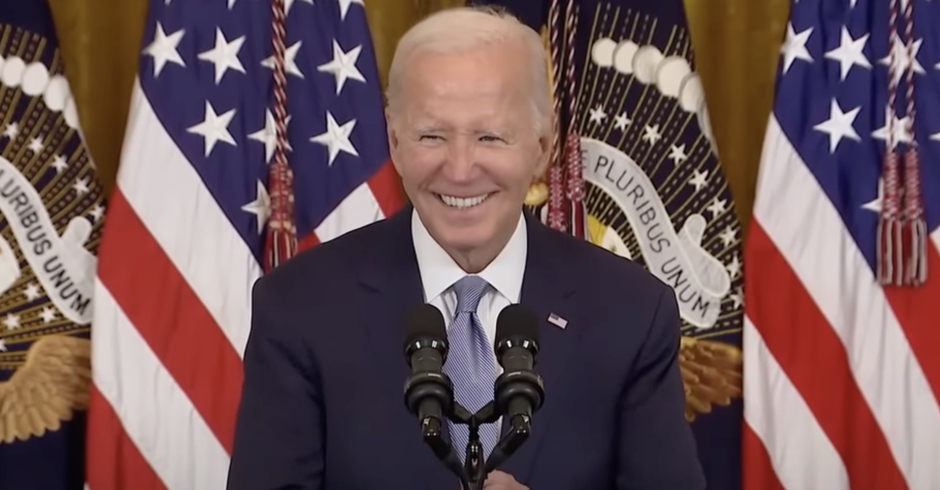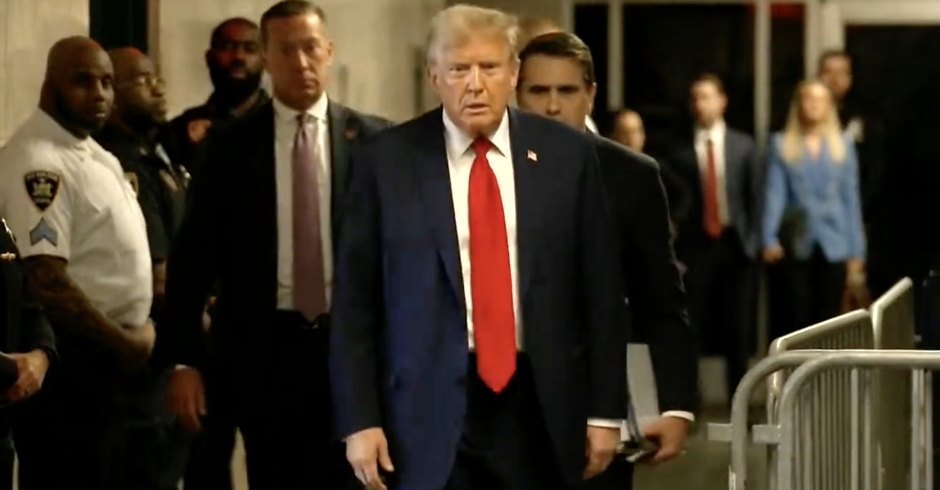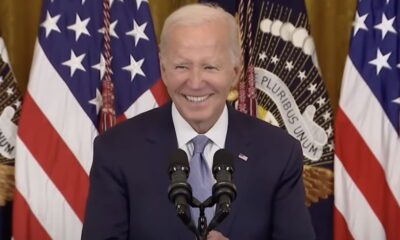WATCH: Michelle Obama Denounces New Anti-Gay ‘Religious Freedom’ Law as ‘Progress Hurtling Backward’
First Lady Delivers Powerful Commencement Speech at Jackson State University
First Lady Michelle Obama denounced Mississippi‘s new, sweeping, anti-gay “religious freedom” law on Saturday afternoon, calling it progress hurtling backward, as she delivered a powerful and motivating commencement address to graduates at Jackson State University.Â
“So, graduates, as you seek to develop your own strategies to address the problems that still plague our communities, I just ask you to remember that the power of voting is real and lasting,” Mrs. Obama urged. “So you can hashtag all over Instagram and Twitter, but those social media movements will disappear faster than a Snapchat if you’re not also registered to vote, if you’re not also sending in your absentee ballot.”
“If we fail to exercise our fundamental right to vote, then I guarantee that so much of the progress we’ve fought for will be under threat,” the First Lady warned. “Congress will still be gridlocked. Statehouses will continue to roll back voting rights and write discrimination into the law.”
“We’ve got to stand side by side with all of our neighbors – straight, gay, lesbian, bisexual, and transgender.” –The First Lady #JSUGrad16
— The First Lady (@FLOTUS) April 23, 2016
“We see it right here in Mississippi — just two weeks ago -– how swiftly progress can hurtle backward, how easy it is to single out a small group and marginalize them because of who they are or who they love,” Mrs. Obama told the 800 graduates among the crowd of 35,000.
“So we’ve got to stand side by side with all our neighbors –- straight, gay, lesbian, bisexual, transgender; Muslim, Jew, Christian, Hindu immigrant, Native American — because the march for civil rights isn’t just about African Americans, it’s about all Americans. It’s about making things more just, more equal, more free for all our kids and grandkids. That’s the story you all have the opportunity to write. That’s what this historic university has prepared you to do.”
“The march for civil rights isn’t just about African-Americans…it’s about all Americans.†–The First Lady the graduates of @JacksonStateU.
— The First Lady (@FLOTUS) April 23, 2016
President Barack Obama on Friday called for both the Mississippi law and North Carolina’s anti-LGBT law to be overturned.
Watch the First Lady’s entire speech above – forward to the one hour, thirty-eight minute mark. Or watch just the relevant portion, which begins at about the two-hour mark.Â
The text of the First Lady’s entire speech, via the White House, is below:
4:05 P.M. CDT
    MRS. OBAMA: Hey, y’all. (Applause.) Hey! I’m excited now! (Applause.) Oh, my goodness! You all good? (Applause.) All right, enough about me. This is about you. (Applause.)Â
Â
Let me start by thanking Dr. Meyers for that wonderful introduction, and more importantly, for her leadership of this fine university.Â
Â
I also want to thank Mayor Yarber, Representative Thompson, and all of the elected officials and members of Congress who are here with us today, as well as Mr. Perry, all of the trustees — Dr. Blaine, Reverend Rhodes, of course, all of the faculty and staff here at Jackson State. Let’s just take a moment to give it up to the people who helped get you here. (Applause.) Thank you all for your incredible hospitality. I wouldn’t be anywhere else but here. I may be a little jetlagged, but I’m here, right now, to celebrate all of you. (Applause.) So I’m grateful.Â
Â
I also have to thank the symphonic band and both of the choirs today for that beautiful music. You all are amazing. (Applause.) And of course, before we go way in, we have to give it up to all the folks in the stands who helped you all get here –- the moms and dads, brothers, sisters, grandparents, cousins, friends, and neighbors — all of you all — let’s give it up! (Applause.) Give it up!
Â
And finally, most of all, I want to join in congratulating
— oh, what a good-looking group — the men and women of the Jackson State University Class of 2016! (Applause.) Woo! You all deserve all of that more, because I know how hard you worked to make it to this day, studying late into the night, writing and rewriting those papers, taking all those exams. Oh, my lord. Â
Â
But I also heard that you have been able to have some fun over these past years, as well -– hanging out Gibbs-Green Plaza, turning up on Hot Spot Fridays at the Horseshoe. (Applause.) Don’t get too excited — mom and dad are in the stands. (Laughter.)  Gearing up for Homecoming and Tiger Fest, “rocking the house†with one of the best bands in the country, the Sonic Boom of the South. (Applause.) Together, you all are the “Superb Sixteen†-– as I hear you call yourselves. (Applause.) And you’re about to join a storied legacy from this university, a school that began as a tiny Baptist seminary, just 20 students strong — just 20 students.  But today has a legacy that reaches across the country and this state and right here into this very stadium.Â
Â
And that’s actually where I’d like to start my remarks today, with this storied stadium and its place in our nation’s history. Now, back in 1950, when this stadium was built, it was one of the finest stadiums in the country, quickly became the pride of Mississippi. But the story of this beautiful complex also has a darker side. For years, it stood as a steel and concrete tribute to segregation, because Jim Crow laws meant that only white teams and fans were allowed through these gates.
Â
Back in 1962, during an Ole Miss football game, this stadium became the site of what was essentially a pro-Jim Crow rally, with fans waving Confederate flags and singing a song called “Never No Never†to protest the admission of an African American student to their university. By halftime, they’d convinced the governor to even speak. He said just three sentences. He said, “I love Mississippi. I love her people, our customs. I love and respect our heritage.â€Â And the crowd went wild, because they knew exactly what he meant.
Â
That game was just one small moment in a struggle of civil rights that enflamed this entire country, but often burned hottest right here in Mississippi, the state where a 14-year-old boy named Emmett Till was beaten and murdered. Where NAACP leader Medgar Evers was assassinated. Where Freedom Riders overflowed the jails. Where gunshots would ring out here on your campus, killing young people and littering one of your dorms with bullet holes still seen today.Â
Â
It was against that backdrop that one day in October of 1967, something truly extraordinary happened in this stadium. For years, legal and political pressure had been mounting for the state to desegregate. And that fall, the state finally announced that for the first time, two black teams would get to play in this stadium. Those teams were Grambling State and, of course, your own Jackson State Tigers. (Applause.)  Â
Â
Now, just think for a moment. You can only imagine the pressure those teams and their fans were feeling. For so long, this field had been the pride of white –- and white only -– Mississippi, and now, black fans would fill these stands. Black coaches would patrol these sidelines. Black players would sweat and bleed on this field. How would the world respond? Would those forces of segregation rise up in protest, or worse? As one of the players at the time said –- this is a quote — he said, “There was certainly potential for it to become a very ugly situation.â€Â
Â
So the Jackson State coach at the time, Coach Paige, thought hard about how to prepare his team. He sat his players down and told them to stay focused on two goals. The first: Beat Grambling State, of course, one of the best teams in the country. The second: He said, rise above the fray and set a good example, he said, because the whole state, the whole country would be watching.Â
Â
So the players made sure their shoes were shined, their laces tied. They took special pains not to accidentally break anything in the locker room or walk out with a towel. Because as that player said — and these are his words — he said, “We all wanted to be representatives of our families, our hometowns, our communities.â€Â “We wanted to take care of that stadium as much as we could so it would be there for the next black team.â€
Â
And then they went out and they played their hearts out. And Jackson State won that game, giving Grambling its only loss of the season. But more importantly, the world saw what would happen when black folks came into this stadium. What did they see? They saw people enjoying a football game. They saw the same kind of skill and sportsmanship and strategy as any other game this stadium had hosted before.
Â
So by simply showing and displaying sportsmanship, those players and coaches and fans joined the long line of heroes who made history in this country — in our schoolhouses, our department stores, our lunch counters and everywhere else — all of them using that same time-tested approach that has always moved this country forward. They didn’t stoop to the level of those who sought to oppress them. Just the opposite: They rose up; they combatted small-mindedness with dignity, integrity, and excellence.Â
Â
That is the well-worn path to Dr. King’s mountaintop that so many men and women before us have taken -– famous civil rights leaders and ordinary folks who faced down dogs, and batons, and firehoses with prayer and hope and steadfast determination. For as Dr. King told us, he said, “Darkness cannot drive out darkness; only light can do that. Hate cannot drive out hate; only love can do that.â€
Â
And, graduates, I’m here today to tell you that that approach to life isn’t just something you should read about in the history books. It’s a road map for how to live your lives every single day. And how do I know? Because I’ve seen the power of that approach up close and personal.Â
Â
See, when I hear words like dignity and excellence, I think about my husband. (Applause.) See, I know I’m biased — and I do think he’s cute, too. (Applause.) But as I’ve walked this journey with Barack, I’ve gotten a pretty good look at what it means to rise above the fray, what it means to set your eyes on the horizon, to devote your life to making things better for those who will come after you. I have seen how, no matter what kind of ugliness is going on at any particular moment, Barack always stays the course. (Applause.)  Â
Â
See, I’ve watched him stay up late night after night, reading and writing and wrestling with the impossible decisions that a President is forced to make. I’ve been inspired by his tireless effort to engage people of all backgrounds –- respectfully listening to folks who disagree with him, bringing folks together to solve our common problems.Â
Â
And week after week, I see him read the letters he gets from people across this country -– and let me tell you, he writes back because he knows that they are who he serves. I see him dedicating himself to helping folks on the margins, folks who often don’t have a voice. That is the work of his life, from his days as a community organizer in Chicago to his time in the White House today. And we all know that that empathy, that preparation, that moral compass, that relentless work ethic have led to so much progress over the past seven years.Â
Â
We’ve gone from the brink of another Great Depression in this country to our businesses creating more than 14 million new jobs. Our unemployment rate has been cut in half. Our deficits are down by two-thirds. Our high school graduation rates are the highest on record. Over 20 million more people now have health insurance. And people in this country are finally free to marry the person they love. And on the global stage, the vast majority of our troops are home today. And our country isn’t putting our heads in the sand on climate change –- no, we are leading the way to stop it. (Applause.)  Â
Â
I could go on and on. But that’s the progress we’ve seen under this President. That’s the kind of change we all hoped was possible eight years ago. Yet, too often, instead of acknowledging or celebrating this change, we have a tendency to focus on conflict and controversy. We pay endless attention to folks who are blocking action, blocking judges, blocking immigration, blocking a raise in the minimum wage. Just blocking. We are consumed with the anger and vitriol that are bubbling up, with folks shouting at each other, using hateful and divisive language.
Â
And then there’s the countless times when that language gets personal and is directed at my husband –- charges that he doesn’t love our country. The time he was called a liar in front of a Joint Session of Congress. The nonstop questions about his birth certificate and his belief in God.
Â
Now, I know, I know that politics has always been a rough sport. I also know that well-meaning folks can get heated in the midst of contentious debates. And in light of today’s 24-hour news cycle, in this era where our Facebook feeds are limited to the voices of folks who think exactly like we do and our TVs and radios are exclusively tuned in to those who tell us only what we want to hear, it’s not surprising that our disagreements have become more personal, more intense. It’s not surprising that we too often demean or dismiss opinions that are different than our own.
Â
But we would be kidding ourselves if we didn’t acknowledge that those age-old issues that have always roiled our country -– the problems a lot of folks would just rather brush under the rug -– those challenges are still with us today. We can’t deny it.
Â
However, graduates, even in these volatile times, it would be unfair for us to ignore the changes we’ve seen in a generation. No longer can we be barred from a university or a hotel, or arrested for sitting at the front of the bus, or forced to use a separate bathroom or water fountain because of the color of our skin. No one is going to poll test us by demanding that we recite the Constitution or correctly guess the number of jelly beans in a jar before we’re allowed to vote. So, yes, we continue to make progress here in America.
Â
But we also know that the shadows of the past have not completely disappeared. Despite all the progress we’ve made, I know that so many of you still see these shadows every single day. Maybe it’s when you’re driving somewhere, and you stop for no particular reason. Maybe it’s when the store you enter into, folks seem to keep an extra close eye on you as you shop. Maybe it’s when you walk down the sidewalk and folks cross the street when they see you coming.
Â
Maybe it’s when the early voting location in your neighborhood just happens to be closed, or law after law is passed about the kind of ID you need to cast your vote. Maybe it’s all those schools that, despite the laws, are still very much separate and unequal, or the criminal justice system that still doesn’t provide truly equal justice for far too many, or those neighborhoods that are struggling still to overcome the painful legacy of the past.  Â
Â
I wish I could say otherwise, graduates, but the question isn’t whether you’re going to come face-to-face with these issues; the question is how you’re going to respond when you do. Are you going to throw up your hands and say that progress will never come? Are you going to get angry or lash out? Are you going to turn inward, and just give in to despair and frustration? Or are you going to take a deep breath, straighten your shoulders, lift up your head, and do what Barack Obama has always done –- as he says, “When they go low, I go high.â€Â (Applause.) Â
Â
That’s the choice Barack and I have made. That’s what has kept us sane over the years. We simply do not allow space in our hearts, minds, or souls for darkness. Instead, we choose faith
–- faith in ourselves, in the power of hard work. Faith in our God, whose overwhelming love sustains us every single day. That’s what we choose. (Applause.)Â
Â
We choose love –- our love for our children, our commitment to leaving them a better world. Our love for our country, which has given us so many blessings and advantages. Our love for our fellow citizens –- parents working hard to support their kids, men and women in uniform who risk everything to keep us safe, young people from the toughest backgrounds who never stop believing in their dreams -– young people like so many of you.
Â
That’s what we choose. And we choose excellence. We choose to tune out all the noise and strive for excellence in everything we do. No cutting corners. No taking shortcuts. No whining. We give 120 percent every single time, because excellence — excellence is the most powerful answer you can give to the doubters and the haters. (Applause.)  Â
Â
It’s also the most powerful thing you can do for yourself, because the process of striving and struggling and pushing yourself to new heights –- see, that’s how you develop your God-given talents. That’s how you make yourself stronger and smarter and more able to make a difference for others.
Â
So those are the choices that Barack and I have made. Because in the end, we know our history, and we know that there will always be challenges and obstacles, but we also know that what we’re dealing with today is nothing -– nothing -– compared to the violence, discrimination, and hatred that folks faced decades ago.Â
Â
And while this may feel like a volatile time — while we may be rightfully horrified by the divisive rhetoric we’re hearing in our public conversation, while we may be broken-hearted that we’re still dealing with the issues of poverty, and mass incarceration, and gun violence — it is remarkable progress that these issues are seeing the light of day at all. It’s remarkable progress that the vast majority of Americans in all corners of the country vehemently disagree with this hateful language. It is remarkable progress that we’re having these conversations on a national level –- and not just in black communities, but in all communities.
Â
So, graduates, make no mistake about it, this moment presents a historic opportunity for change. And your generation, more than any generation in our history, truly has the tools and opportunities you need to seize this moment. I want you to think about the statistics. Today, more African Americans are graduating from college, succeeding in our workplaces, taking on positions of leadership, and reporting greater optimism about the future –- an optimism, by the way, that I very much share.
Â
So the question is: Are you ready to step up and use your power and your privilege to make change? Will you honor the legacy of those who came before you who fought so hard, sacrificed so much so that you could be here in this stadium wearing those beautiful caps and gowns today?Â
Â
And if you have any question as to what that legacy is, let me just share with you a quick story. Several months ago, I was meeting with a group of teenage girls from Washington, D.C., and one of them asked me, “Well, what do you think Dr. King would say about everything that’s going on today?â€Â And I told her that none of us can really answer that question. But I said that  Dr. King would probably answer it with a simple question –- and that is: “Did you vote?â€Â (Applause.) Did you vote?Â
Â
See, I told the young woman that I think Dr. King would be very concerned that after folks like Medgar Evers and so many others gave their lives fighting for the right to vote, that today, in almost every election, more than half of young African Americans have essentially disenfranchised themselves. In the 2014 midterms, African American youth turnout was less than 20 percent –- fewer than one in five of our young people voted. And here in Mississippi, it was almost lower — certainly lower.  Â
Â
But Dr. King understood was that one of the surest paths to progress here in America runs straight through the voting booth. That’s been the key to every single stride we have ever taken in this country –- from fighting discrimination to passing health care. It all starts with the ballot.
Â
So, graduates, as you seek to develop your own strategies to address the problems that still plague our communities, I just ask you to remember that the power of voting is real and lasting. So you can hashtag all over Instagram and Twitter, but those social media movements will disappear faster than a Snapchat if you’re not also registered to vote, if you’re not also sending in your absentee ballot. (Applause.)  Â
Â
If we fail to exercise our fundamental right to vote, then I guarantee that so much of the progress we’ve fought for will be under threat. Congress will still be gridlocked. Statehouses will continue to roll back voting rights and write discrimination into the law. We see it right here in Mississippi — just two weeks ago -– how swiftly progress can hurtle backward, how easy it is to single out a small group and marginalize them because of who they are or who they love.Â
Â
So we’ve got to stand side by side with all our neighbors –- straight, gay, lesbian, bisexual, transgender; Muslim, Jew, Christian, Hindu immigrant, Native American — because the march for civil rights isn’t just about African Americans, it’s about all Americans. It’s about making things more just, more equal, more free for all our kids and grandkids. That’s the story you all have the opportunity to write. That’s what this historic university has prepared you to do.
Â
So, graduates, here is my challenge to you today: I want you to honor the legacy of our past by making your mark on the future. Graduates, I want you to choose a career that you believe in, something that doesn’t just make money but that truly makes a difference for others. And I want you to do whatever you can to reach back and pull those who still are struggling with you.Â
Â
Graduates, I want you all to be excellent at everything you do –- be an excellent boss; be an excellent employee; be an excellent parent, mentor, congregant, neighbor. Be excellent. And, graduates, when you encounter small slights or small people, I hope and I pray that you stand tall and respond with dignity and grace. Because no one –- no one -– ever succeeds in this world by playing small.
Â
And finally, graduates, I just want you to remember that decades from now, someone will be standing here where I’m standing today and they will be telling that new class of graduates about all of you. So we’re counting on you to live lives worthy of retelling, lives that will inspire our next generation to keep walking that path to righteousness and doing the work to fulfill that dream.Â
Â
Because here’s the thing. I know you can do that and so much more. That’s why I am here. I am so proud of you all for making it to this day, for pushing and fighting, because I know if you hold tight to the example of the folks who have led us this far, if you choose faith and love, if you strive always for dignity and excellence, then there is absolutely nothing you can’t achieve.Â
Â
I say that from the bottom of my heart, because I’m not here because I’m special; I was you. And if I can be here, you can do it, too. (Applause.) And if you ever doubt the impact you can have, I just want you to think back to the story of this school
— this great school that you are now a part of. That tiny little seminary, as you see it now, is a distinguished university, one of the largest, most vibrant HBCUs in the country. This is your alma mater. (Applause.) Pushing forward in science and technology, the arts, education, and so much more. You all, that’s your legacy. Â
Â
And that Jackson State football coach I mentioned earlier who helped desegregate this stadium — his full name is Rod Paige, and he went on to become our nation’s first African American Secretary of Education. (Applause.)  Â
Â
And as for that crowd that rallied for segregation in these stands, singing “Never No Never†— well, just 50 years later, our country elected an African American President for a second time, declaring “Yes, we can!â€Â (Applause.)  Â
        Â
Graduates, that is what’s possible in this country of ours. That is the direction history can take when passionate, courageous, talented young people like all of you step up and lead the way. I know you’ve got it in you. I can feel it right from here. And as you say here at Jackson State, the world better get ready — because here you all come. (Applause.)  Â
Â
I love you all so much. I hope you have a phenomenal day. I will pray for you every step of the way. God bless you all. Good luck on the road ahead. (Applause.) I’m proud of you all. (Applause.)Â
Â
         END           4:33 P.M. CDT
Â
###
Â
Image:Â Jackson State University/Livestream
Hat tip: Michael K. Lavers/Washington Blade
Â

Enjoy this piece?
… then let us make a small request. The New Civil Rights Movement depends on readers like you to meet our ongoing expenses and continue producing quality progressive journalism. Three Silicon Valley giants consume 70 percent of all online advertising dollars, so we need your help to continue doing what we do.
NCRM is independent. You won’t find mainstream media bias here. From unflinching coverage of religious extremism, to spotlighting efforts to roll back our rights, NCRM continues to speak truth to power. America needs independent voices like NCRM to be sure no one is forgotten.
Every reader contribution, whatever the amount, makes a tremendous difference. Help ensure NCRM remains independent long into the future. Support progressive journalism with a one-time contribution to NCRM, or click here to become a subscriber. Thank you. Click here to donate by check.
 |












